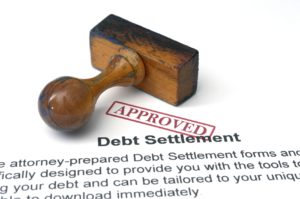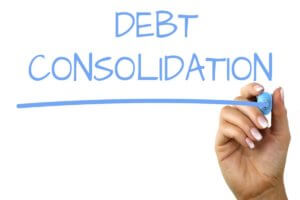The Full Story about Debt Settlement
Reviewed by:

Debt settlement offers the opportunity to get out of debt for a fraction of what you owe. That can be a big advantage when you owe so much that you cannot reasonably afford to pay everything back. However, it’s not without its risks. This guide will explore options that allow you to settle debts for less than you owe so you can understand this solution as you research the best way to get out of debt.
What is debt settlement?
Debt settlement refers to any process that allows you to get out of debt for less than the full amount you owe. You pay a percentage of the principal, which is the actual balance due on the account. Then the creditor discharges the remaining balance.
There are three ways that Canadians can settle a debt. You can:
- Negotiate a settlement directly with a single creditor or debt collector.
- Enroll in a debt settlement program through a private, for-profit company.
- Work with a Licensed Insolvency Trustee to arrange a consumer proposal.
The last option is the most widely accepted and the most likely to succeed on a large scale because it’s a process established through the Bankruptcy and Insolvency Act. If you need a solution to settle as many of your debts as possible, you may want to look at consumer proposals. We have a consumer proposal guide that can provide more information.
But for now, let’s take a closer look at the other two options for debt settlement.
How debt settlement works outside of a consumer proposal
Given that Canadians can file a formal consumer proposal through the courts, settling debts outside that system can be problematic. That’s not to say it’s impossible, but you need to understand the process and the risks.
Here is an overview of how each debt settlement process outside of a consumer proposal works.
1. Negotiating debt settlement directly with a creditor or collector

This type of settlement is something you can do on your own. If you have a single account that is charged-off or has already been sold to a third-party collector, you work out a settlement directly with that company.
In some cases, the creditor or collector may initiate this process with a settlement offer. Then you can make a counteroffer to try to get the lowest percentage possible.
You can also initiate a settlement offer yourself. You write a letter to the creditor or collector offering a percentage of what you owe. Then the creditor or collector may counter, and you go from there.
This type of settlement works well if you have just one or two problem accounts. For example, let’s say you went through a period of financial hardship. You managed to keep most of your bills current, but two accounts went to collections. This can work to help you take care of those accounts quickly once you start to recover.
If you are conducting this type of settlement negotiation, it’s recommended to communicate strictly in writing. Make sure to get a signed copy of a settlement agreement that states the amount and the terms of your settlement. Only pay once you receive this agreement and you are satisfied that the terms reflect your arrangement with the creditor.
2. Enroll in a debt settlement program with a private, for-profit company
A second option that you may hear about is a program that allows you to settle multiple debts at once with professional help.
- You enroll in a debt settlement program through a private company.
- The company sets up an account where you divert any funds that you have available to generate the money necessary to make settlement offers.
- Then the company contacts your creditors to negotiate settlements, working to get you the lowest possible percentage.
- Once settlement agreements are reached, the amount is paid out of the account.
- This process continues until all your debts are settled.
In theory, this sounds beneficial. A company of expert negotiators working on your behalf should get you the best settlements. After all, when you work with a Licensed Insolvency Trustee, they evaluate your budget to see what you can reasonably afford to repay. So, it would make sense to hire a company that’s out to protect your best interests.
However, in reality, the private debt settlement process is fraught with risks. Let’s look at those now to understand why this debt solution is generally not advisable.
The risks of private debt settlement programs
1. Results are not guaranteed
The first and biggest risk of working with a private debt settlement company is that there is no guarantee that it will work.
When you arrange to settle your debts through a consumer proposal, your creditors are bound by the terms of the agreement. The trustee sends all your creditors the proposal and they vote to accept or reject it. As long as the majority of your creditors accept it, all your creditors must honour the formally binding agreement.
By contrast, there is no formal agreement with your creditors when you settle with a private company. In fact, there is no initial contact at all. The debt settlement company will only contact your creditors once there are funds available to make an offer.
There’s no guarantee that when the debt settlement company contacts a creditor, that they will agree to settle. You may spend time and money working to get settlements, only to have the offers rejected. That can lead to even more complications.
2. You may pay high fees even if the company doesn’t get complete results
While companies are required to get successful settlements on your behalf before they get paid they may not be able to settle with all your creditors. They can charge high fees, but only achieve results on a portion of your debt .
This means you could be out a significant amount of money and still be left with some of your debt. That’s not a situation you want to be in when you were already having trouble keeping up with your obligations.
What’s more, the fees charged are so significant, that once you add in these fees, you may not be saving as much as you thought you would.
3. You may face legal action from your creditors
This is another potential byproduct of the fact that your creditors aren’t looped in on this type of settlement agreement early in the process as they are with a consumer proposal.
If you are not making the required payments on your debts or communicating with collectors, then they may decide to take you to court. You could face lawsuits as creditors and collectors attempt to try and force you to pay.
In court, collectors and creditors could get judgments that lead to wage garnishment and liens on a property you own. Something like wage garnishment will make it even more difficult to get a creditor to settle because they can garnish your wages to recoup everything they are owed.
By contrast, entering a consumer proposal provides an automatic stay of proceedings. This prevents collectors and creditors from taking you to court. It also stops wage garnishment orders that are already in place. Thus, you have protection from legal actions when you use a consumer proposal that you don’t enjoy with a debt settlement program.
Debt settlement and your credit
Another serious issue with a debt settlement program is the degree to which it damages your credit.
The credit report notation for debt settlement is the same regardless of which way you settle your debt. Each revolving account, such as a credit card, that is settled will generate an R7 credit report notation. Installment accounts (loans) generate an I7 notation. These types of notations will negatively affect your credit score.
However, the amount of time these notations remain depends on which solution you use to settle your debt. If you complete a consumer proposal, the notations will remain for three years from the date you complete the proposal. However, with any other settlement method, the notation will remain for six years. It affects your credit twice as long.
This offers another reason why a consumer proposal may be preferable to a debt settlement program or trying to settle multiple debts on your own.
It’s important to note that other solutions can limit credit damage even further. For example, a debt management program will only be noted on your credit report for two years.
The cost of debt settlement
Another important point to discuss with debt settlement is the cost. On the surface, debt settlement can help you save significant money. You get out of interest charges and fees and only repay a percentage of the principal debt owed.
On the other hand, the fees for debt settlement can be high compared to other solutions. For a consumer proposal, there is a $1,500 filing fee plus 20 percent of your future payments. With a debt settlement program, most companies charge fees based on the original debt you owed. This means that some of the money you save by not paying interest charges ends up going to pay the debt settlement company.
Fees may vary based on the province or territory where you reside, the total debt you want to settle, and the company’s fee structure. The Financial Consumer Agency of Canada warns that companies may require high fees that get paid upfront. These fees may not be refunded even if the company is unsuccessful at negotiating settlements on your behalf. However, this can vary based on the province or territory where you reside.
For example, in Ontario debt settlement companies are regulated by the Collection and Debt Settlement Services Act (CDSSA). This act prohibits fees from being charged by a debt settlement company until a settlement has been reached.
If you decide to try a debt settlement program:
- make sure the company provides a summary of all their fees upfront, including information on when and how fees get paid
- ask if fees are refundable or the company has a money-back guarantee if they do not settle debts in your favour
- do not pay anything until you have a signed contract
Alternatives to debt settlement
Consumer proposals
If you are overwhelmed with debt and believe that you simply cannot afford to repay everything you owe, a consumer proposal is usually the best option. A Licensed Insolvency Trustee can evaluate your finances to determine what you can reasonably afford to pay.
This path to debt settlement is preferable for several reasons:
- It offers an automatic stay of proceedings that protects you from wage garnishment, court actions, and collection calls.
- Your creditors are legally bound by the proposal, so the settlement arrangement is assured.
- Your rights are protected under the Bankruptcy and Insolvency Act.
- Fees are clearly structured and rolled into the payments you make to the trustee
Credit counselling
A good step before you decide on debt settlement or a consumer proposal is to contact a nonprofit credit counselling service. A trained credit counsellor can assist you in evaluating your debts, credit, and budget to decide on your best course of action for getting out of debt.
The evaluation is free and confidential, and there is no obligation to sign up for anything. As such, it can help you determine if there’s a way that you can pay back everything you owe or if settlement is your best option.
In some cases, you may be able to repay your principal in full by minimizing interest. A debt management plan can consolidate your debt into one payment. Most creditors agree to eliminate interest entirely, while others will reduce it by a significant percentage. This could reduce your total payments by up to 50 percent and may reduce your monthly payments as well.
A trained credit counsellor will only recommend a debt solution if it’s the best option to use in your situation. Thus, credit counselling offers a way to determine your best course of action with a trained professional.
Request a free debt and budget evaluation from a trained credit counsellor.
Frequently asked questions about debt settlement
No. This is a common misconception. Credit counselling agencies like Consolidated Credit provide debt management programs. These are distinctly different from debt settlement in several ways:
- With a debt management plan, you pay off the full principal debt owed with reduced interest; debt settlement only repays a portion of the principal debt owed.
- Your creditors agree to a debt management plan upfront when you enroll, which helps prevent legal actions against you. With a debt management plan, your creditors are paid every month; with debt settlement, your creditors are not paid until a settlement agreement is reached.
- A debt management plan will be noted on your credit report for two years from the date you complete the program; debt settlement will be noted on your credit for six years.
Many debt settlement companies will try and pass their services off as credit counselling. It’s important to ask the right questions, such as when your creditors get paid, so you ensure you are signing up for the right service.
Debt settlement and debt consolidation share some common benefits:
- One monthly payment
- Reducing the total amount paid to get out of debt
The biggest difference between the two is how much of the principal debt owed gets repaid. With debt consolidation, the full principal is repaid, usually with at least some interest charges. By contrast, debt settlement only repays a portion of the principal debt owed.
There is also a difference in the impact it has on your credit. If you consolidate debt with a personal loan, then you will not incur any negative remarks on your credit report as long as you keep up with the payments.
If you use a debt consolidation program, such as a debt management plan that consolidates your debt to repay it in full, you will incur a negative report remark for two years from the date you complete the program. However, this is less than the three years you will have with a consumer proposal and six years from a debt settlement program.
The credit damage caused by debt settlement varies based on which solution you use to settle your debt. A consumer proposal will remain on your credit report for three years from the date you complete the program. A debt settlement program or individual debt settlement done directly with a creditor will both remain for six years.
Yes. In fact, the process to settle debts through a consumer proposal is a right outlined and protected by the Bankruptcy and Insolvency Act. The Act provides a system whereby Canadians who cannot afford to repay everything they owe can settle their debt through a consumer proposal with the help of a Licensed Insolvency Trustee.
Outside of that outlined path, debt settlement is still a legal means to deal with debt. You can settle debts on your own or work with a debt settlement company. However, this process for debt settlement is not protected under federal law.
According to LoansCanada.ca, the typical debt settlement amount in Canada will range from 30 percent to 70 percent. Settlement amounts vary based on several factors, including who holds the debt, how old or past-due the debt is, and even how proficient the negotiators are.
For example, debts that have been sold to a third-party collector may be easier to settle. These collection agencies purchase portfolios of debt for a small percentage of each balance owed. That means that they can settle for a percentage of the balance owed and still profit from the arrangement.
By contrast, if the original creditor still owns the debt, they may be unwilling to settle or require a higher percentage of the principal.




